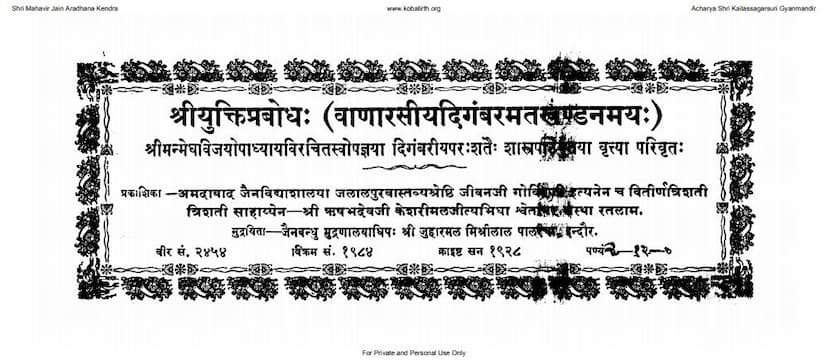Yukti Prabodh
Added to library: September 2, 2025

Summary
This Jain text, titled Yukti Prabodh (Knowledge of Reason), authored by Shrimad Meghavijaya Upadhyaya and published by Rushabhdev Keshrimal Jain Shwetambar Sanstha Ratlam, is a comprehensive refutation of the Digambara sect's doctrines, particularly those attributed to Varanasi Das. The work aims to clarify and establish the Shvetambara perspective, drawing heavily on existing Jain scriptures for support.
The book is structured with an elaborate introduction (Upakrama) followed by a detailed table of contents and extensive lists of supporting texts (Sakshi Granthanam). The core of the work then systematically addresses various points of contention between the Shvetambara and Digambara traditions.
Here's a breakdown of the key themes and arguments presented in the text, based on the provided pages:
Core Purpose and Context:
- The text was written by Meghavijaya Upadhyaya to counter the teachings of "Varanasiya" (followers from Varanasi), specifically the views of Varanasi Das.
- It addresses the emergence and propagation of Digambara views that deviated from established Jain principles.
- The author asserts that while ancient Digambaras had some established differences, the "new" Digambaras from Varanasi introduced more contentious points that needed refutation.
Key Disputed Issues (as per Table of Contents and Introduction):
The Yukti Prabodh systematically dismantles the Digambara viewpoint on a wide range of issues, including:
- Origin and Timeline of Digambara Sect: The text argues that the Digambara sect emerged centuries after Lord Mahavir's Nirvana, citing scriptural evidence.
- Rejection of Certain Digambara Beliefs: The book aims to refute specific Digambara beliefs such as:
- The impurity of women and their inability to attain liberation (Stri Mukti).
- The concept of Kevalins (omniscient beings) not consuming food (Kevali Kevala Ahara Bhav).
- The acceptance of certain practices and beliefs by Digambaras that are considered non-Jain or a departure from the original teachings.
- The significance of various external ascetic practices and accoutrements (Picchikadi Asadhanam).
- The validity and authenticity of Jain scriptures (Purana Pramanyapramanye).
- The origin of certain Digambara texts and dramas (Samaysara Nataka Utpatti).
- The rejection of certain idols and their adornment (Jin Pratima Paridhanika Daropanam).
- The worship and status of Bhaṭṭārakas (Digambara spiritual leaders) (Bhaṭṭārakānām Apujyatvam).
- The acceptance of "other lingas" (external forms) by householders (An'ya Gr̥hillagin'yoh Siddhiḥ).
- The denial of the existence of certain Jain practices and beliefs by Digambaras.
- The invalidity of certain Digambara doctrines by demonstrating their contradiction with established Jain principles and the teachings of omniscient beings.
- Defense of Shvetambara Practices: The text implicitly or explicitly defends Shvetambara practices that were criticized by Digambaras, such as:
- The acceptance of women's liberation.
- The belief in the possibility of food consumption by Kevalins (though the Shvetambara view on this is complex and often nuanced).
- The worship of idols with adornments.
- The emphasis on both scriptural adherence and the importance of correct reasoning (Yukti).
- The validity of adherence to external practices (like wearing clothes) as long as internal purity is maintained.
- Emphasis on Reason and Scripture: The title itself, "Yukti Prabodh," highlights the importance of reason and logical deduction in understanding Jain principles. The author relies on a vast array of scriptural references (Sakshi Granthas) to support the Shvetambara arguments.
Methodology and Tone:
- The author systematically analyzes and critiques the Digambara positions using scriptural evidence, logical reasoning, and comparative analysis.
- The tone is argumentative and polemical, aiming to definitively refute the Digambara claims and establish the superiority of the Shvetambara viewpoint.
- The text engages with specific interpretations and arguments put forth by Digambara scholars and texts.
Significance:
- The Yukti Prabodh represents a significant work in the history of Jain sectarian debates, particularly between the Shvetambara and Digambara traditions.
- It provides valuable insights into the doctrinal differences and the intellectual efforts made by scholars to defend their respective positions.
- The extensive list of supporting texts underscores the deep engagement with scriptural knowledge and the desire to ground arguments in established tradition.
In essence, Yukti Prabodh is a scholarly and polemical treatise that meticulously dissects Digambara doctrines, arguing for their deviation from foundational Jain teachings and advocating for the validity and correctness of the Shvetambara perspective based on scripture and reason.